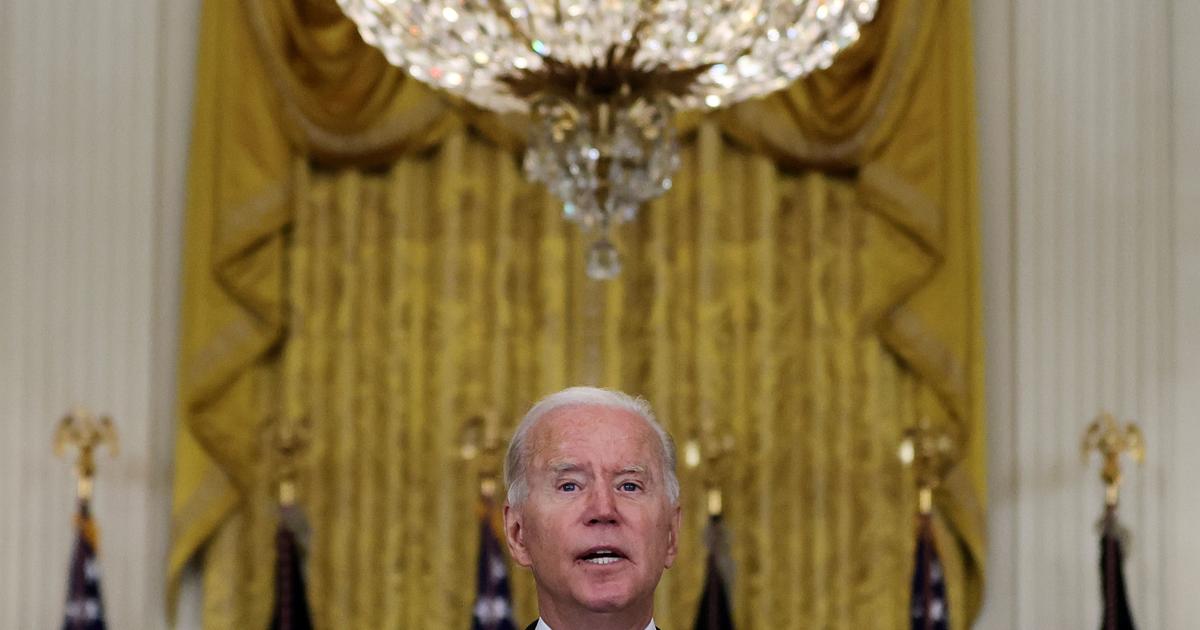
Washington — President Biden on Wednesday pitched his $3.5 trillion tax and spending plan to boost social programs and fight climate change, dubbed the “Build Back Better” agenda, after the Senate passage of the $1 trillion bipartisan infrastructure bill.
But the president started off his remarks by noting his administration is monitoring the increase in gas prices and inflation, as the federal government announced Wednesday inflation remains at an annual rate of 5.4% — a 20-year high. The attention from the president is an indication that the White House, which at points has downplayed inflation and gas prices as merely temporary, is increasingly recognizing the need to publicly address the pinch on American families.
The president said the Federal Reserve is keeping an eye on inflation to act, if necessary, with inflation still at a 20-year high at an annual rate of 5.4%. The president blamed price spikes on shipping bottlenecks and the consolidation of major agricultural corporations, while Republicans are blaming the trillions of dollars the U.S. has pumped into the economy in the wake of the pandemic.
The president noted the bipartisan infrastructure bill doesn’t increase gas prices, but recognized that gas prices are touching American families. According to AAA, the average price of a gallon of gas in the U.S. is $3.19, compared to $2.17 one year ago.
“I want to make sure that nothing stands in the way of oil price declines leading to lower prices for consumers,” Mr. Biden said from the White House East Room Wednesday. “So today, my director of the National Economic Council has asked the chair of the Federal Trade Commission to use every available tool to monitor the U.S. gasoline market, and address any illegal conduct that might be contributing to price increases at the pump while the cost of a barrel of oil is going down.”
The president said the U.S. is also urging the Organization of the Petroleum Exporting Countries, better known as OPEC, to return gas production to pre-pandemic levels.
Republicans have been railing against the Biden administration over inflation and gas prices, issues they could use against him and House Democrats if they remain high ahead of the 2022 midterm elections. Republican members of Congress have focused on inflation as a key messaging matter.
After addressing inflation and gas prices, the president turned to his social spending plan, insisting it’s a “long-term investment in American families” that will reap dividends.
“The investments I am proposing will be fully paid for over the long term by having the largest corporations, including the 55 corporations that paid zero federal tax last year, and the super wealthy begin to pay their fair share,” the president said. “They will still make a lot of money, but pay their fair share. That means it will actually reduce the national debt. It will improve our fiscal position over the long run.”
The Senate passed a $1 trillion bipartisan infrastructure bill on Tuesday, with 19 Republicans joining all 50 Democrats to approve $550 billion in new spending on things like roads, bridges, waterways and rural broadband. Senators then held a marathon session to debate a budget resolution that paves the way for the larger package, adopting the measure in a party-line vote of 50-49 early Wednesday morning.
The House plans to return to Washington this month to consider the budget resolution, among other things, Majority Leader Steny Hoyer said. Speaker Nancy Pelosi has said the House will not vote on the $1 trillion infrastructure package until the Senate finalizes the $3.5 trillion plan, which could take months. The Senate went into recess after Wednesday’s votes and plans to return September 13.
The $3.5 trillion measure serves as the blueprint for Mr. Biden’s social spending agenda, and will include funds to combat climate change, establish child care programs, expand Medicare and provide a pathway to citizenship for undocumented immigrants. Democrats can pass the measure using a process known as budget reconciliation, which would not require the support of any Republicans.
Mr. Biden said Tuesday that he expects Democrats to unite behind both plans, despite some disagreements over the price tag and scope of the larger proposal.
Senator Joe Manchin, a moderate Democrat from West Virginia who has become arguably the most influential senator in the chamber, voiced concern over the cost of the $3.5 trillion proposal, even as he voted to move forward with the procedural vote early Wednesday.
“Early this morning, I voted ‘YES’ on a procedural vote to move forward on the budget reconciliation process because I believe it is important to discuss the fiscal policy future of this country,” Manchin said in a statement. “However, I have serious concerns about the grave consequences facing West Virginians and every American family if Congress decides to spend another $3.5 trillion … Given the current state of the economic recovery, it is simply irresponsible to continue spending at levels more suited to respond to a Great Depression or Great Recession — not an economy that is on the verge of overheating.”
Jack Turman contributed to this report.

